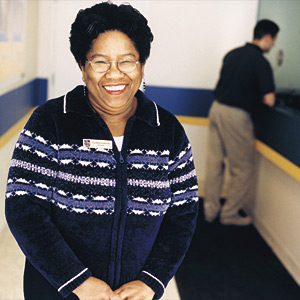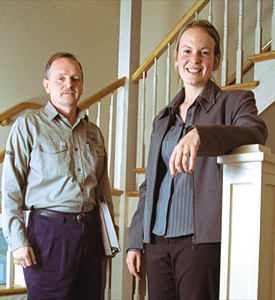     |
 |
 |
 |
| |
RBC’s vision of helping build prosperity together
is most evident in our community economic development initiatives. We
invest our skills, knowledge and leadership to help develop a sustainable
economic infrastructure in the communities where we work and live.
Promoting self-sufficiency
Social and Enterprise Development Innovations (SEDI) is a national organization
that promotes economic self-sufficiency for disadvantaged Canadians.
In 2003, RBC was proud to continue our involvement with SEDI on two
fronts.
RBC is the lead financial institution supporting 9
of the 10 Learn$ave sites across Canada. Learn$ave is the largest demonstration
project in the world of Individual Development Accounts (IDAs). IDAs
were developed to encourage
participants to invest their own personal savings and receive a matched
contribution from the federal government that will be used for personal
economic
development such as post-secondary
education, skills training or small business capitalization.
As stated by one of the nearly
4,000 participants: “Learn$ave helped me make something of myself.
I was able to save a nominal amount of money and match it with an amount
significant enough to make a difference.” To date,
participants have saved over $1.7 million and received close to $5 million
in matched contributions.
RBC is also involved in SEDI initiatives for young
people who face barriers to self-sufficiency. Employees in 34 Canadian
communities have helped with “The A Game” and “Youth.comm” – programs
that have reached over 8,000 young
people, and are designed to increase financial literacy and promote awareness
of entrepreneurship. RBC also supports SEDI’s E-Thinker, an innovative
one-day experience that exposes secondary school students to the power
of entrepreneurial thinking, and self-employment initiatives for people
with disabilities.
RBC has committed to work with SEDI over the next
three years on strategies that will allow more young people become self-sufficient.
For more information, visit
sedi.org
Toward prosperity through partnerships
The prosperity of communities and nations both depend on a strong business
sector. RBC believes that leaders of
industry, government and other key stakeholders have a shared responsibility
to work together in creating the
conditions necessary to grow successful, world-class companies that can
tap into markets across North America and around the world. This mission
is not only critical to business, it is critical to the future prosperity
of our communities.
Aside from providing financial
services to small, medium-sized and corporate businesses, RBC also
participates in a number of partnerships, such as with the Canadian
American Business Council, to help create a business climate of
competitiveness and profitability. Our employees are also active members
of local Chambers of Commerce across North America, in most communities
where we operate. Access to basic banking services
 |
|
| |
 |
Some people prefer not
to deal with a traditional bank branch. RBC’s Cash & Save,
which opened its first site in Toronto’s Parkdale area
in October 2002, is designed to meet their needs.
Cash & Save offers a combination of smaller premises, fair
pricing, non-traditional banking hours, specialized product
offerings and ongoing community consultation. It offers lower-cost
cheque cashing and financial services and focuses on the quick
delivery of routine transactions, such as immediate cheque
cashing, bill payments, money orders and money transfers.
In 2003, we opened a second test site in Toronto’s Regent
Park area, in partnership with the Yonge Street Mission. “Cash & Save allows low-income people to engage in
normal financial transactions at a trustworthy institution,” says
Rosemary Gray-Snelgrove of the Yonge Street Mission. “This brings dignity and self-respect to those who have
financial responsibilities, but until now, had no financial
institution to serve them.” |
|
RBC’s Yolande Quan-Vie leads
a team of five employees at our new Cash & Save site
in Toronto. All live in the community and, among them, speak
Tagalo, Spanish, German, Tamil, Cantonese and Mandarin. Providing
essential banking services, such as money orders and cheque
cashing, Cash & Save’s transaction fees are significantly
lower than other retail financial service providers.
IMAGE: Krista Sjaarda |
|
|
| |
|
A bridge to success
Many skilled immigrants lack Canadian experience, and this prevents them
from getting jobs and contributing to Canada’s economy. Career
Bridge, an internship program for highly trained recent
immigrants, aims to change that.
Career Bridge will work with employers across all
industry sectors
to provide paid internships to new Canadians who qualify for professional
and managerial positions. Interns will be pre-screened for workplace
language skills, education and international work experience.
In 2003, the program began as a pilot project in Toronto,
with RBC among participating employers.
The interns’ expertise and skills are
in high demand, in fields that include technology, engineering, finance
and accounting, manufacturing management, international marketing and
human resources. The new program will operate through Career Edge, an
internship
program that helps provide meaningful work experiences for graduates
of
all disciplines. A good start in business
RBC employees across Canada and the U.S. are among the experienced business
people who give their time and energy
to Junior Achievement (JA). JA is an international organization that
provides students with a first-hand glimpse into the world of business
and entrepreneurship by offering practical business education programs
in schools.
Many employees go into classrooms to deliver JA
programs – such
as the more than 900 RBC volunteers across Canada who devoted 10,670
hours to delivering the Economics of Staying in
School and Business Basics programs.
Some employees raise money, such as those in Burlington,
Ontario, who earned more than $5,000 in the 2003
JA Bowlathon. Others, like employees from RBC Mortgage in Columbus,
Ohio, help students set up a business that operates like a real company.
RBC Foundation supported JA
organizations across North America, with donations of more than $250,000
in 2003. Jobs equal success
RBC believes that a well-trained workforce is one key to a community’s
economic success. That’s why we support programs like La
Cinquantelle,
offered
by the Women’s Centre of Montreal, to develop the employability
of women over the age of 50. RBC has hired a number
of candidates referred by the Centre,
and also donated $45,000 to the Centre, which helps fight poverty among
women and their families, particularly by helping women re-enter the
labour force.
In addition, RBC supported the launch of
a new program offered by the Canadian Manufacturers & Exporters Association (CME) to help CME
member companies meet the increasing demand for skilled employees by
hiring internationally trained workers.
The program is part of the CME’s successful
Business Results series. This package will encourage employers
to tap the relatively unexploited pool of skilled workers who have
international training and provide employers with resources that
will ease the process of integration from the initial search through
language training. The materials will include
a series of case studies from some of Canada’s leading companies. Sharing
expertise
 |
|
| |
 |
Sometimes it’s not
how much money you give, but the time and
passion you invest in a cause that reap the greatest returns.
That’s what thousands of our employees have learned over
the
years. Take, for example, Krista Green, from RBC in St. John’s,
Newfoundland. Once a month, Krista meets with new entrepreneurs
to share her knowledge and help them get their fledgling
businesses off the ground.
A mentor with the YMCA-YWCA Enterprise
Centre, a not-for-profit business development agency that promotes
self-employment,
Green works with two new entrepreneurs at a time,
advising on a variety of business issues, from managing finances
to marketing. Between meetings, she’s available to respond
to
questions or problems that arise.
“As a new entrepreneur, you need to be disciplined,” Green says. “We
set out an action plan for each entrepreneur and monitor their
progress monthly. I’m a strong advocate
that
meeting once a month keeps them on track and helps them
achieve their ultimate goal.” |
|
Mike Conway, a St. John’s,
Newfoundland, entrepreneur, meets with
RBC’s Krista Green for advice on marketing, sales and
strategic planning.
A typical meeting might involve an analysis of how Mike’s
business, Homestead Inspections, has grown, and an assessment
of his costs and competition so he can plan for the future.
IMAGE: Terry Rice |
|
|
| |
|
|
|
| |
|
Without the essentials of life, such as food and
housing, it’s
nearly impossible for people to achieve their full potential. RBC Financial
Group supports programs that address these needs in the communities where
our employees live and work.
Putting food on the table
Without the basics of life, it’s nearly impossible for people to
achieve their
full potential. So making sure those in need get enough to eat is a cause
that’s close to the heart of thousands of
RBC employees. They hold bake sales to raise money for local food banks,
donate money earned through dress-down Fridays, engage in friendly competitions
with neighbouring branches to see who can collect the most food items and
encourage clients to support their efforts.
In addition, RBC gave over $250,000 to replenish food
banks across Canada. Among major donations: $25,000 to the Edmonton Gleaner’s Association,
$15,000 to the Lethbridge Food Bank Society, $10,000 to the Regina Education
and Action on Child Hunger, and $100,000 in the four Atlantic provinces. Solutions to homelessness
RBC believes that having a roof over your head is a basic human right,
and we invest our resources in a number of initiatives to fight homelessness.
RBC was a co-sponsor of Habitat for Humanity’s
Ed Schreyer Work Project 2003. The project toured Western Canada, teaming
up with families in need to build affordable homes – and building
Habitat’s 700th Canadian home since 1985.
Not only has RBC donated over
$1.2 million to Habitat for Humanity since 1998, but employees
across North America have been involved with community builds.
For example, RBC Mortgage supports Habitat for Humanity in
Chicago, while RBC Dain Rauscher works for the cause in Minneapolis.
Raising the Roof, whose mission is
to find long-term solutions to homelessness, once again received
strong support from RBC for its annual Toque Tuesday fundraising
campaign in Canada. Employees sold toques, raising close to
$42,000 for local agencies, while RBC’s corporate support totalled $50,000.
Innovative solution for Aboriginal housing
One of the most pressing needs in Aboriginal communities is for
adequate housing. Helping make this possible
is an innovative solution RBC Royal Bank developed in partnership
with select
First Nations.
In Canada, under the Indian
Act,
First Nation members living on a reserve are restricted from mortgaging
their property as collateral security. In 1999, RBC Royal Bank worked
with selected First Nations to develop a housing loan product that
mirrors a conventional mortgage. Now, members who would qualify for
an off-reserve conventional mortgage can obtain on-reserve housing
loans
without a ministerial guarantee.
For more information about
RBC’s support of community economic development, visit
rbc.com/community
Economic revitalization brings hope
 |
|
| |
 |
Eastern North Carolina is
among the most economically depressed regions in the U.S. The
Foundation of Renewal for Eastern North Carolina (FoR ENC)
aims to give the area new hope. “FoR ENC’s mission
is to unite the 41 counties of Eastern North Carolina as a
unique identity and brand,” says its
president, J. Phillip Horne.
RBC Centura was a driving force behind FoR ENC’s creation. “In
addition to pivotal financial support,” Horne says, “RBC Centura has contributed in many ways by providing
leadership, vision and human capital to the challenging but rewarding
process of trying to shift a regional culture toward entrepreneurship.”
In the spring of 2003, FoR ENC
hosted the One East economic summit, which brought together the
region’s stakeholders
to discuss common challenges and brainstorm new ideas and opportunities
in a number of global growth
industries such as travel and tourism, information technology,
biotechnology, and agriculture and biopharmaceuticals. |
|
Shifting a regional culture toward
entrepreneurship: that’s the goal of a new economic revitalization
group in Eastern North Carolina, says its president, J. Phillip
Horne. RBC Centura is playing a pivotal role in the project.
IMAGE: John Bullard |
|
|





